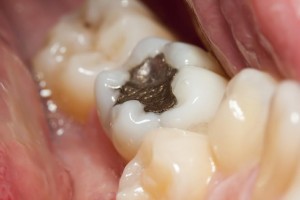You may have perfect dental hygiene habits, but that doesn’t mean you are excluded from developing a cavity. By the age of 17, nearly 80 percent of people have had a cavity. It’s never fun to deal with dental hygiene issues, but it’s better to get a cavity fixed sooner rather than later. If you are unsure if you have a cavity, there are several warning signs to look for.
Cavities Cause Pain
An almost absolute sign you have a cavity is if your tooth starts to ache when you are chewing food. When a tooth with a cavity comes into contact with something, you will start to feel pain. Additionally, if you feel a pain in your tooth even if you aren’t eating, that means the nerve is infected. The tooth is in the process of dying, and this can be extremely painful.
Teeth Become Sensitive
If a tooth has a cavity, it can become very sensitive to certain foods and drinks. Hot and cold foods and liquids can irritate the tooth, and you may be able to pinpoint the particular foods or drinks in your daily routine that are causing the issue. While sensitivity to hot and cold food and drinks could be related to other dental hygiene issues, it’s still important to visit a dentist to find out what exactly is going on, even if you don’t have a cavity.
Cavities Cause Holes & Dark Spots
Sometimes, a cavity can cause a small, visible hole in your tooth. At this point, the tooth can become very brittle and start to chip away, even with proper dental hygiene. You may also notice a dark spot on the tooth, and the entire tooth itself could become darker.
Bad Breath
Bad breath can form because of a variety of issues, but it can also be a sign of a cavity. Food particles can become stuck in the small holes formed by cavities, and the decayed food can lead to bad breath. This is more easily spotted, if you normally have a proper dental hygiene procedure each morning and night.
Cavities & Sugar
Teeth with cavities are susceptible to foods with sugar. The amount of sensitivity will depend on the individual, but a mild pain may occur when a person with a cavity eats sugary foods.
Your well-being is important to the professionals of Leikin & Baylin Dental Care of Catonsville. If you’re concerned that you or someone in your family has a cavity, let our friendly and professional staff help restore your dental health. Call today at 410-747-1115, or submit any questions by visiting CatonsvilleDentalCare.com.
Disclaimer: The writer of this article is not a medical professional. Information contained herein has been collected from sources believed to be reliable, and every precaution has been taken to ensure its accuracy. The information provided here is for general informational purposes only, and should not be used as a substitute for professional medical care.

